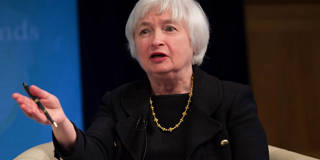The unprecedented period of coordinated loose monetary policy since the beginning of the financial crisis in 2008 could have large unintended consequences. In particular, institutional investors, such as pension funds, have responded to near-zero interest rates by making riskier investments – leaving them dangerously exposed.
LONDON – In his Pulitzer-Prize-winning book, Lords of Finance, the economist Liaquat Ahamad tells the story of how four central bankers, driven by staunch adherence to the gold standard, “broke the world” and triggered the Great Depression. Today’s central bankers largely share a new conventional wisdom – about the benefits of loose monetary policy. Are monetary policymakers poised to break the world again?
Orthodox monetary policy no longer enshrines the gold standard, which caused the central bankers of the 1920s to mismanage interest rates, triggering a global economic meltdown that ultimately set the stage for World War II. But the unprecedented period of coordinated loose monetary policy since the beginning of the financial crisis in 2008 could be just as problematic. Indeed, the discernible effect on financial markets has already been huge.
The first-order impact is clear. Institutional investors have found it difficult to achieve positive real yields in any of the traditional safe-haven investments. Life insurers, for example, have struggled to meet their guaranteed rates of return. According to a recent report by Swiss Re, had government bonds been trading closer to their “fair value,” insurers in America and Europe would have earned some $40-$80 billion from 2008 to 2013 (assuming a typical 50-60% allocation to fixed income). For public pension funds, an additional 1% yield during this period would have increased annual income by $40-50 billion.

LONDON – In his Pulitzer-Prize-winning book, Lords of Finance, the economist Liaquat Ahamad tells the story of how four central bankers, driven by staunch adherence to the gold standard, “broke the world” and triggered the Great Depression. Today’s central bankers largely share a new conventional wisdom – about the benefits of loose monetary policy. Are monetary policymakers poised to break the world again?
Orthodox monetary policy no longer enshrines the gold standard, which caused the central bankers of the 1920s to mismanage interest rates, triggering a global economic meltdown that ultimately set the stage for World War II. But the unprecedented period of coordinated loose monetary policy since the beginning of the financial crisis in 2008 could be just as problematic. Indeed, the discernible effect on financial markets has already been huge.
The first-order impact is clear. Institutional investors have found it difficult to achieve positive real yields in any of the traditional safe-haven investments. Life insurers, for example, have struggled to meet their guaranteed rates of return. According to a recent report by Swiss Re, had government bonds been trading closer to their “fair value,” insurers in America and Europe would have earned some $40-$80 billion from 2008 to 2013 (assuming a typical 50-60% allocation to fixed income). For public pension funds, an additional 1% yield during this period would have increased annual income by $40-50 billion.